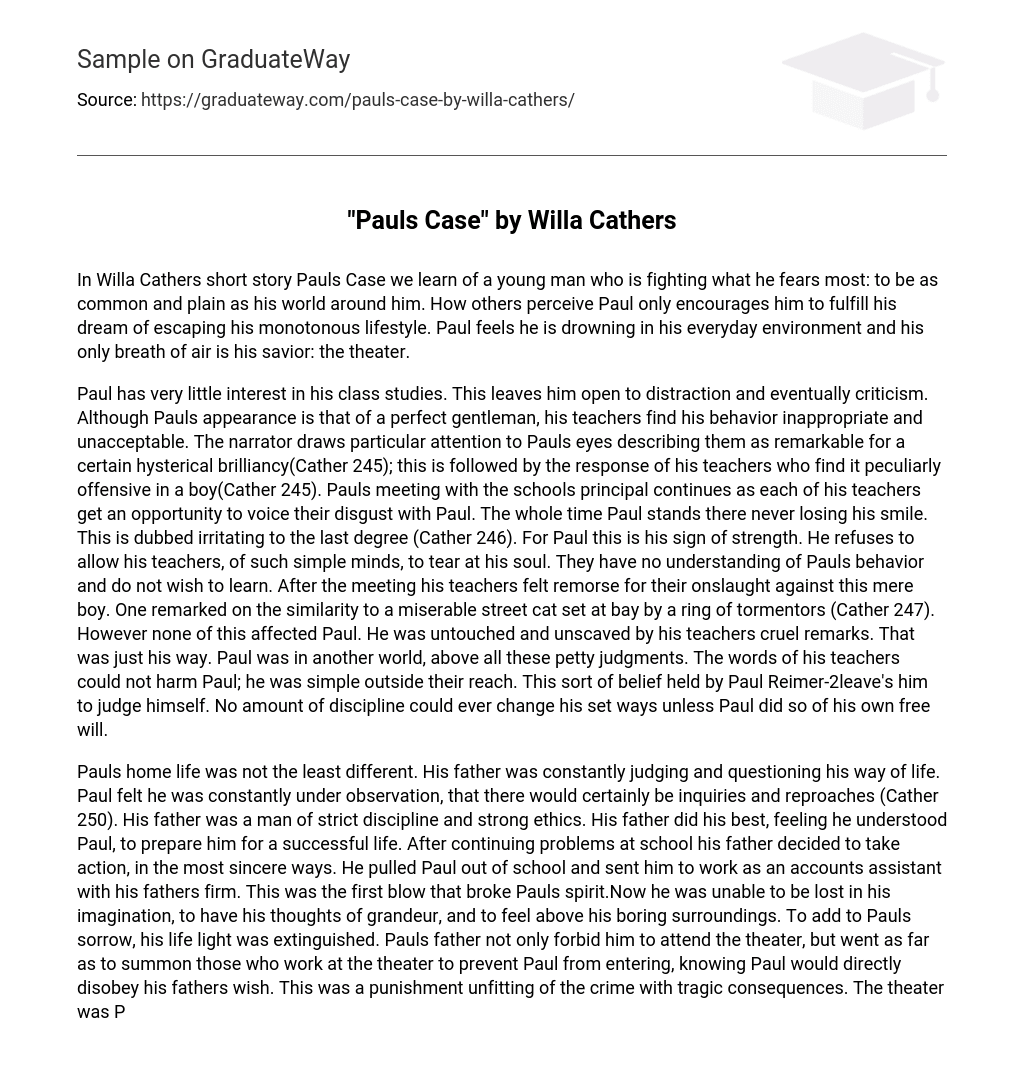The short story “Paul’s Case” by Willa Cather introduces us to a young man who fears becoming ordinary and unremarkable like the people and things around him. Paul is driven to escape his dull life due to how others perceive him. He feels stifled by his mundane surroundings and finds comfort in the theater, which he sees as vital for his survival.
Despite appearing as a perfect gentleman, Paul’s lack of interest in his studies makes him vulnerable to criticism and distraction from his teachers. His remarkable yet offensive eyes draw negative attention from the narrators. In a meeting with the school principal, Paul’s teachers express their disgust with his behavior while he stands there smiling, which irritates them greatly. However, this smile showcases Paul’s strength as he refuses to let his teachers affect him. The teachers show no understanding or interest in learning about Paul’s behavior. After the meeting, they feel remorse for attacking this young boy and compare their actions to tormenting a helpless street cat. Nevertheless, none of this affects Paul as he remains unperturbed by their cruel remarks. He exists in his own world, unaffected by their judgments. Paul believes he is above petty criticisms and judges himself accordingly unless he decides otherwise; no level of discipline can change his fixed behavior.
Paul’s home life was characterized by his father constantly judging and questioning his choices. He felt like he was constantly being watched and would face inquiries and reproaches. His father believed in strict discipline and strong morals, and did his best to prepare Paul for a successful future. However, after facing ongoing problems at school, Paul’s father took drastic action. He pulled him out of school and made him work as an accounts assistant at his firm. This decision shattered Paul’s spirit, as it prevented him from escaping into his imagination or feeling superior to his mundane surroundings. Adding to his sadness, his father not only forbade him from attending the theater but even went as far as summoning theater employees to ensure Paul couldn’t enter. This punishment was disproportionate to the crime and had tragic consequences. The theater was Paul’s secret love and without it, his life became dull and monotonous. When he was at the theater, he felt alive and free, like a prisoner who had been released. Indeed, Paul’s life felt like an unending prison, with his schools, home, and neighborhood acting as suffocating walls. He lived in a constant state of depression, punctuated only by sporadic bursts of life.Reimer-3Paul truly lived at the theater at Carnegie Hall (Cather 253). However, when his father deprived him of the theater, Paul became a lifeless body going through the motions without any emotions, only longing to escape. Whenever Paul was allowed to attend the theater as a spectator or an usher, he felt alive again with a sudden zest for life (Cather 248). This freedom was always short-lived. Like an addiction, the theater would temporarily elevate him to heaven only to cause him to fall harder into his bleak existence. He experienced a physical depression (Cather 250) that was only surpassed by the theater itself, which was the only thing that made him feel truly alive (Cather 249). I noticed a similarity between Willa Cather’s “Paul’s Case” and William Shakespeare’s Romeo and Juliet. Both stories feature forbidden love. In Romeo and Juliet, their families prevented their love, but it was too strong to deny. The tragic death of Romeo is accompanied by the equally tragic death of Juliet. I believe Paul embodies the role of Romeo, with his forbidden love for the theater being his Juliet. He cannot imagine living without it. When Paul left New York City, he had briefly experienced the lifestyle he dreamed of, and the thought of returning to Cordelia Street, with its yellow wallpaper and somber atmosphere, filled him with despair and misery. He had tasted his sweet dream and feared the despair that would await him upon his return.Cather, Willa. “Paul’s Case.” Perrine’s Literature Structure, Sound and Sense.
He experienced a familiar sensation that the orchestra had suddenly ceased and a sinking feeling that the play was over (260). Ultimately, Paul opted for death instead of returning to his dull lifestyle in Pittsburgh, Pennsylvania. His obsession with the theater allowed him to exist indefinitely in a single moment. He became increasingly lively and animated, with color returning to his face and lips (248). He resided within the theater, immersing himself in its atmosphere (254). The theater provided Paul with vitality and an escape from the bland, monotonous existence of everyday life (250).
Ed. Laura Webb. New York: VG Bild-Kunst, 2001. 245-62





